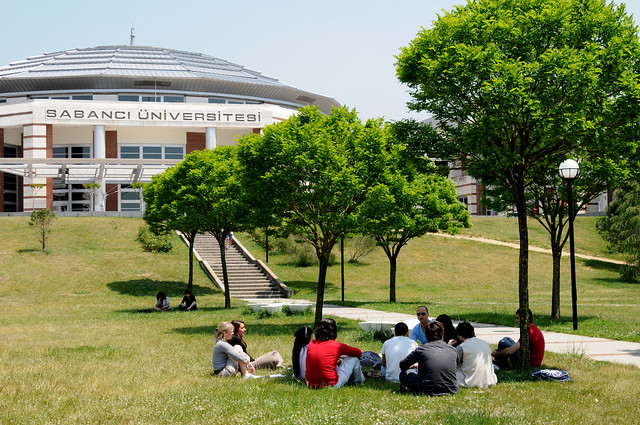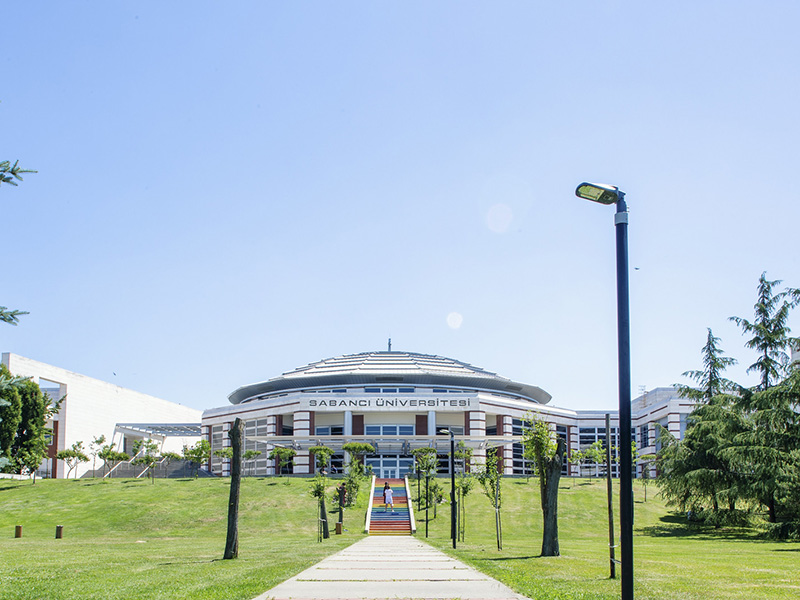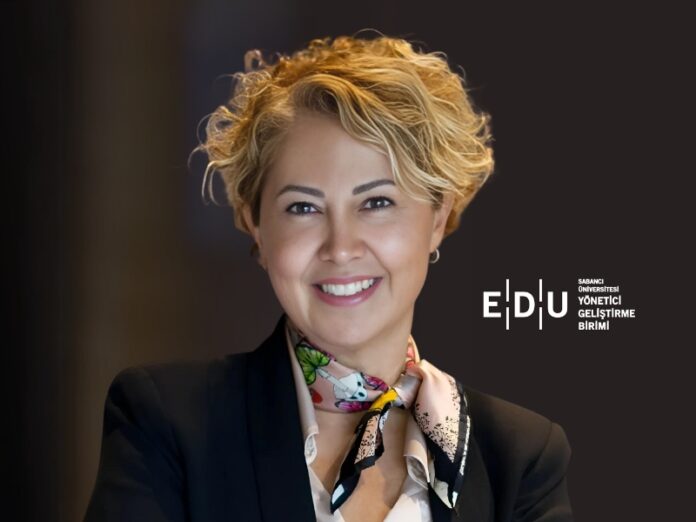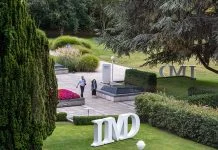Interview with Gonca Borerkci Baybas of Sabancı University Executive Education Unit (EDU)
Since its launch in 2002, the Sabancı University Executive Education Unit (EDU) has progressively climbed the ranks among institutions providing solid and integrative executive education. In this interview with EBR, Gonca Borerkci Baybas, the university director, discusses EDU´s globally relevant program, its research-ready faculty, and its rise from the 78th to 34th place in the Financial Times Custom Programs ranking in six short years!
Good day, Mrs Baybas! We’re grateful for the opportunity to meet with you today. Can we begin with a few words on how your journey with Sabanci University started?
Sabancı University was established in 1994 with the vision of becoming a global university and welcomed its first students in 1999. Our university’s mission is to educate capable and confident individuals on national and international levels while contributing to knowledge and research in natural sciences, engineering, social sciences, humanities, and management. Sabancı University Executive Education Unit- EDU was launched in July 2002 to bridge the gap between the business world and academia. Since then, as the leading institution among universities providing Executive Development Programs in Turkey, EDU has supported many leading organizations in Turkey on their development journeys. EDU’s global recognition continues to grow each year.
Sabanci University has a distinctive educational approach that merges practical and theoretical knowledge. Could you provide some examples of how this approach has benefited your Executive Development Unit?
This distinctive educational approach of Sabancı University greatly enhances the effectiveness of EDU’s programs by integrating research with industry insights, fostering collaborative learning and customizing content we ensure that our executive programs deliver meaningful, actionable, and long-lasting benefits to both individuals and organizations.
Our faculty members are actively engaged in pioneering research across various fields, and this research often shapes the content and structure of our executive programs. For instance, when designing a leadership development program, we incorporate the latest findings on organizational behavior and leadership theories, while simultaneously enriching the content from current industry challenges and trends. This fusion ensures that our participants gain a deep understanding of theoretical concepts while also learning how to apply them in practical, everyday scenarios within their organizations.
Our approach also gives room for partnering with industry practitioners to co-create content, design case studies, and conduct workshops. This collaboration ensures that our programs reflect the latest industry practices and challenges. For example, in a program focused on energy management, we worked closely with an energy tech company to develop case studies and invite guest speakers from public and private corporations’ energy management professionals. With these sessions, participants not only learn about energy management but also gain insights through experience sharing of real-life problems and scenarios.
How does Sabanci University EDU ensure its programs remain relevant and aligned with the evolving needs of the business world?
Yes, we must ensure our programs remain relevant and aligned with the evolving needs of the business world.
By fostering strategic partnerships and collaborations, we gain valuable insights into industry needs and emerging trends.
First of all, our faculty members -either academic or professional – actively engage in industry-specific research and projects, and we leverage insights from thought leaders, market reports, and sector analyses. All this work strengthens the design and content of our programs, ensuring they address current and anticipated business needs. For example, a recent program on artificial intelligence was developed in response to growing industry demands and technological advancements, incorporating the latest developments and best practices.
Also, EDU maintains strong connections with leading organizations, corporations, industry experts, and professional organizations. By fostering strategic partnerships and collaborations, we gain valuable insights into industry needs and emerging trends.
One remarkable point worth mentioning here is our membership in the University-Based Executive Education Consortium (UNICON). UNICON is a global consortium of business‐school‐based executive education organizations including prestigious universities such as Harvard, INSEAD, London School of Economics, IMD, and Columbia. This membership allows us to participate in a comprehensive exchange of knowledge and experience in executive development programs with schools worldwide. We use the insights gained from this exchange to develop innovative programs and create content on the prevailing topics using the most current methods and hence, stay abreast of global trends in executive education.
In addition, EDU consults with advisory boards and expert panels composed of leading professionals, academics, and industry veterans. These boards provide strategic guidance and insights on curriculum development, program design, and industry relevance.
Our program design process is inherently agile, allowing us to respond quickly to changes in the business environment and feedback coming from the customers. We use flexible and adaptive methodologies to develop and update program content.
Our program design process is inherently agile, allowing us to respond quickly to changes in the business environment and feedback coming from the customers. We use flexible and adaptive methodologies to develop and update program content. This agility is reflected in our ability to introduce new modules, update case studies, and integrate emerging topics on short notice. For example, when the COVID-19 pandemic accelerated the need for remote leadership skills, we swiftly incorporated virtual collaboration tools and remote management strategies into our programs.
Last but not least, we prioritize identifying and incorporating emerging skills and competencies that are becoming increasingly important in the business world. Through consultations with industry leaders and analysis of future workforce trends, we ensure that our programs address skills such as digital literacy, innovation management, and cross-cultural communication.
What are some of the most successful programs offered by EDU, and what distinguishes them from other executive education offerings in the market?
Embracing the University’s cross-disciplinary approach, EDU was founded as an exec-ed unit equally distant to each Faculty at Sabancı University so that interdisciplinary and interfaculty programs are designed and executed. EDU has a wide range of highly successful programs with such an interdisciplinary and interfaculty approach including management, social sciences and engineering.
For example, our outstanding programs address contemporary topics such as innovation and entrepreneurship, sustainability, technology, data analytics, artificial intelligence, cybersecurity, new-generation leadership, diversity & inclusion.
All our programs are designed with a focus on practical application, ensuring that participants can directly translate their learning into actionable strategies within their organizations. We incorporate the latest trends, technologies, and research findings into our programs, keeping our content relevant and forward-looking. We include interactive learning tools through workshops, simulations, and real-world case studies, allowing participants to engage deeply with the material and develop practical skills. Also, we bring together a diverse team of expert faculty and industry leaders to provide participants with insights from both academic and practical perspectives. During the implementation period, we follow our participants closely with an experienced operations team and follow every feedback to ensure a smooth and efficient learning journey in which the learning outcomes are fully achieved.

Could you discuss the role of local values in the design and delivery of these programs? How are they integrated with global perspectives?
We tailor our program content to reflect the local values, traditions, and business practices of the region in which our participants operate. This contextualization ensures that the learning experience is relevant and resonates with participants’ everyday experiences. For instance, when designing a program for Turkish executives, we incorporate local case studies, examples, and business scenarios that reflect the unique economic and cultural landscape of Turkey. This approach not only makes the content more relatable but also provides practical insights that participants can directly apply to their organizations.
While incorporating local values, we ensure that our programs are grounded in global best practices and frameworks. We achieve this by blending internationally recognized theories and methodologies with localized content.
While incorporating local values, we ensure that our programs are grounded in global best practices and frameworks. We achieve this by blending internationally recognized theories and methodologies with localized content. For example, our leadership programs might use global leadership models and competencies but adapt them to reflect local leadership styles and cultural nuances. This approach helps participants understand and apply global concepts in a manner that is consistent with their local context.
We facilitate cross-cultural exchange and learning by creating opportunities for participants to engage with peers from different countries and cultural backgrounds. This interaction helps to broaden their perspectives and appreciate diverse viewpoints.
The university has made significant strides in the Financial Times rankings, climbing to 34th place in 2024. What do you believe were the key factors that contributed to this achievement?
Rankings are not only significant indicators regarding our success in the executive education field but also an important factor that keeps the bar high for all of us at EDU.
We were ranked 78th in 2018 being the first and only school that made it to the list from Turkey, moreover, the only school in our close geographic region. Ever since, we have been rising, making it to the 34th school on the list among very reputable and well-known institutions.
The key factor that contributed to this achievement would be our philosophy and approach to learning. We don’t see it as training on a specific competency or topic but as a holistic learning journey. This journey includes academy and industry partnerships and co-creation, bringing together local and global perspectives, the newest learning methodologies, continuous improvement of tools and techniques; and meticulous implementation as I mentioned before.
As the first institution from Turkey to be included in these rankings, what does this accomplishment mean for Sabanci University and the broader Turkish education sector?
Being ranked 34th in the Financial Times Custom Programs ranking is a significant and prestigious achievement for EDU. As the first and only institution from Turkey to be included in these internationally renowned rankings, this accomplishment carries profound implications for both Sabancı University and the broader Turkish education sector.
Being ranked 34th in the Financial Times Custom Programs ranking is a significant and prestigious achievement for EDU.
This ranking serves as a testament to the exceptional quality and impact of EDU’s custom programs. It highlights our commitment to delivering world-class executive education that meets the highest international standards. Achieving a place on this list confirms that our programs are recognized globally for their excellence in design, delivery, and outcomes.
For Sabancı University, this ranking significantly enhances our global reputation. Being featured in the Financial Times rankings places us alongside some of the world’s leading educational institutions and reinforces our position as a prominent player in the global executive education landscape. This also enhances our attractiveness to international partners, collaborators, and faculty. It opens doors for new partnerships with global institutions, businesses, and industry leaders, enriching our programs with diverse perspectives and expertise.
This achievement is not only a milestone for Sabancı University but also a source of inspiration for the Turkish education sector as a whole. It demonstrates that Turkish institutions can compete at the highest levels of global education and highlights the potential for other Turkish universities and programs to gain international recognition. It fosters a sense of pride and encourages further innovation and excellence within the sector.
The inclusion of a Turkish institution in such a prestigious ranking highlights Turkey’s growing influence and potential in the global education arena. It reflects the country’s capacity to produce high-quality educational programs and contributes to Turkey’s reputation as a center of academic and intellectual excellence.
What challenges and opportunities have you encountered in bringing these programs to a global audience?
For over 20 years since our establishment, we have successfully developed and delivered professional management programs for employees of numerous national and international companies in Turkey.
It is only in the past few years that we have fully committed our energy, resources, and dedication to taking our successful programs beyond our borders. Surely, this renewed focus on international expansion presents both challenges and opportunities.
Understanding and integrating different cultural and corporate contexts into our programs requires a deep and subtle approach. Additionally, navigating various international regulations and establishing strong local partnerships has been crucial to our success. Developing the right partnerships remains a crucial aspect of our strategy. Identifying and aligning with organizations that share our values and dedication to quality has been particularly challenging.
On the opportunity side, the potential to reach a broader audience of professionals worldwide offers significant benefits. By bringing our executive education programs to an international audience, we can contribute to the development of global leadership and management skills. This expansion also allows us to leverage our expertise and reputation to create new strategic partnerships and collaborations across different regions. We are confident that our recent achievements in Financial Times rankings and membership in the University Based Consortium for Executive Education-UNICON further demonstrate the potential of these opportunities.
Our focus on international growth is driven by the desire to enhance the quality of executive education on a global scale and to provide professionals everywhere with innovative and effective management training solutions.

How does EDU adapt its executive development programs to meet the needs of diverse international markets, particularly in terms of cultural and business differences?
We conduct thorough market research and analysis to understand the specific needs and expectations of different regions. This involves engaging with local business leaders, industry experts, and stakeholders to gain insights into regional challenges, opportunities, and cultural nuances. Additionally, we collaborate with local experts and partners to ensure that our programs are informed by on-the-ground knowledge and perspectives. This helps us to bridge any cultural gaps and enhance the effectiveness of our training.
Secondly, we tailor our programs to align with the unique business practices and cultural contexts of each market. This may include customizing content to reflect local industry standards, regulatory environments, and business strategies. We also integrate country/region-specific case studies, examples, and scenarios into our curriculum to make the learning experience more relevant and impactful for participants.
Finally, we continuously gather feedback from international participants and adjust our programs accordingly. This iterative process allows us to refine our offerings and maintain a high level of relevance and quality across different markets.
What can we expect next from Sabanci University, Executive Development Unit?
Our rise continues. We aim to enter the top 20 of the FT Custom global rankings and to achieve a strong position in the global rankings for Open Programs as well.
We will certainly further enhance our achievements in the international arena and become a global reference point for the business world and professionals.










